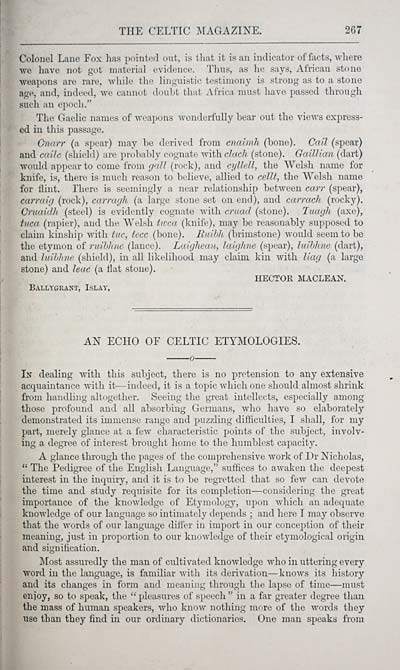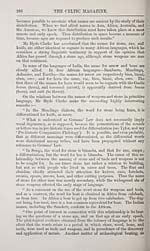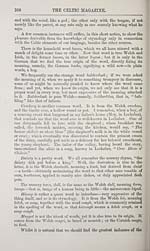Blair Collection > Celtic magazine > Volume 2
(277)
Download files
Complete book:
Individual page:
Thumbnail gallery: Grid view | List view

THE CELTIC I^IAGAZINE. 267
Colonel Lane Fox has pointed out, is that it is an indicator of facts, where
we have not got material evidence. Tlius, as he says, African stone
weapons are rare, while the linguistic testimony is strong as to a stone
age, and, indeed, we cannot doubt that Africa must have passed through
such an epoch."
The Gaelic names of weapons wonderfully bear out the views express-
ed in this passage.
Gnarr (a spear) may be derived from cnaimli (bone). Gail (spear)
and mile (shield) are probably cognate with dach (stone). GailUan (dart)
would appear to come from gall (rock), and eyllell, the Welsh name for
knife, is, there is much reason to believe, allied to cellt, the Welsh name
for flint. There is seemingly a near relationship between carr (spear),
carraig (rock), carragh (a large stone set on end), and carracli (rocky).
Gruaidli (steel) is evidently cognate with cruacl (stone), luagli (axe),
tuca (rapier), and the Welsh twca (knife), may be reasonably supposed to
claun kinship with tuc, iecc (bone). Ruihh (iDrimstone) would seem to be
the etymon of ruihhm (lance). Laigliean, Jaigline (spear), luihline (dart),
and luihlme (shield), in all likelihood may claim kin with Hag (a large
stone) and leae (a flat stone).
HECTOR MACLEAN,
Ballygrant, Islay,
AN ECHO OF CELTIC ETYMOLOGIES.
In dealing with this subject, there is no pretension to any extensive
acquaintance with it — iiideed, it is a topic which one should almost shrink
from handling altogether. Seeing the great intellects, especially among
those profound and all absorbing Germans, who have so elaborately
demonstrated its immense range and puzzling difficulties, I shall, for my
part, merely glance at a few characteristic points of the subject, involv-
ing a degree of interest brought home to the humblest cajiacity.
A glance through the pages of the comprehensive work of Dr Nicholas,
" The Pedigree of the English Language," suffices to awaken the deepest
interest in the inquiry, and it is to be regretted that so few can devote
the time and study requisite for its completion — considering the great
importance of the knowledge of Etymology, upon which an adequate
knowledge of our language so intimately depends ; and here I may observe
that the words of our language differ in import in our conception of their
meaning, just in proportion to our knowledge of their etymological origin
and signification.
Most assuredly the man of cidtivated knowledge who in uttering every
■word in the language, is familiar with its derivation — knows its history
and its changes in form and meaning through the lapse of time — must
enjoy, so to speak, the " pleasures of speech " in a far greater degree than
the mass of human speakers, who know nothing more of the words they
use than they find in our ordinary dictionaries. One man speaks from
Colonel Lane Fox has pointed out, is that it is an indicator of facts, where
we have not got material evidence. Tlius, as he says, African stone
weapons are rare, while the linguistic testimony is strong as to a stone
age, and, indeed, we cannot doubt that Africa must have passed through
such an epoch."
The Gaelic names of weapons wonderfully bear out the views express-
ed in this passage.
Gnarr (a spear) may be derived from cnaimli (bone). Gail (spear)
and mile (shield) are probably cognate with dach (stone). GailUan (dart)
would appear to come from gall (rock), and eyllell, the Welsh name for
knife, is, there is much reason to believe, allied to cellt, the Welsh name
for flint. There is seemingly a near relationship between carr (spear),
carraig (rock), carragh (a large stone set on end), and carracli (rocky).
Gruaidli (steel) is evidently cognate with cruacl (stone), luagli (axe),
tuca (rapier), and the Welsh twca (knife), may be reasonably supposed to
claun kinship with tuc, iecc (bone). Ruihh (iDrimstone) would seem to be
the etymon of ruihhm (lance). Laigliean, Jaigline (spear), luihline (dart),
and luihlme (shield), in all likelihood may claim kin with Hag (a large
stone) and leae (a flat stone).
HECTOR MACLEAN,
Ballygrant, Islay,
AN ECHO OF CELTIC ETYMOLOGIES.
In dealing with this subject, there is no pretension to any extensive
acquaintance with it — iiideed, it is a topic which one should almost shrink
from handling altogether. Seeing the great intellects, especially among
those profound and all absorbing Germans, who have so elaborately
demonstrated its immense range and puzzling difficulties, I shall, for my
part, merely glance at a few characteristic points of the subject, involv-
ing a degree of interest brought home to the humblest cajiacity.
A glance through the pages of the comprehensive work of Dr Nicholas,
" The Pedigree of the English Language," suffices to awaken the deepest
interest in the inquiry, and it is to be regretted that so few can devote
the time and study requisite for its completion — considering the great
importance of the knowledge of Etymology, upon which an adequate
knowledge of our language so intimately depends ; and here I may observe
that the words of our language differ in import in our conception of their
meaning, just in proportion to our knowledge of their etymological origin
and signification.
Most assuredly the man of cidtivated knowledge who in uttering every
■word in the language, is familiar with its derivation — knows its history
and its changes in form and meaning through the lapse of time — must
enjoy, so to speak, the " pleasures of speech " in a far greater degree than
the mass of human speakers, who know nothing more of the words they
use than they find in our ordinary dictionaries. One man speaks from
Set display mode to: Large image | Transcription
Images and transcriptions on this page, including medium image downloads, may be used under the Creative Commons Attribution 4.0 International Licence unless otherwise stated. ![]()
| Early Gaelic Book Collections > Blair Collection > Celtic magazine > Volume 2 > (277) |
|---|
| Permanent URL | https://digital.nls.uk/78483478 |
|---|
| Description | Volume II, 1877. |
|---|---|
| Shelfmark | Blair.3 |
| Attribution and copyright: |
|
| Description | A selection of books from a collection of more than 500 titles, mostly on religious and literary topics. Also includes some material dealing with other Celtic languages and societies. Collection created towards the end of the 19th century by Lady Evelyn Stewart Murray. |
|---|
| Description | Selected items from five 'Special and Named Printed Collections'. Includes books in Gaelic and other Celtic languages, works about the Gaels, their languages, literature, culture and history. |
|---|

